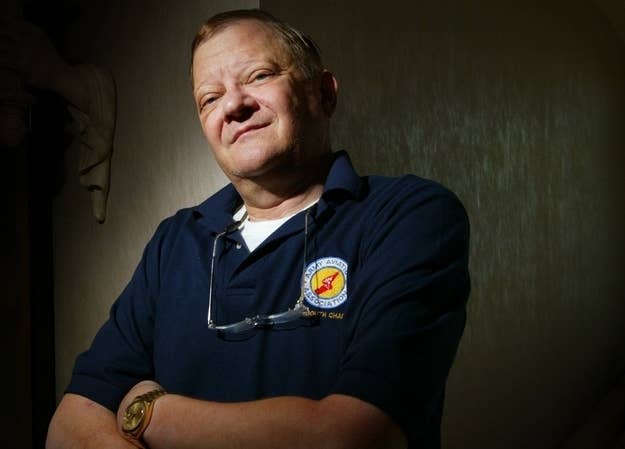
As news broke this morning of author Tom Clancy's death, tributes began to pour in online and across Twitter. Of the many remembrances, one from Adam Sharp caught our eye in particular. According to Sharp — who now works at Twitter — he found Clancy as a teenager in an early AOL chat room, under the username "TomClancy." From there, the two developed an unlikely internet friendship that lasted for years. Adam shared his experience with BuzzFeed.
Until Sean Connery and Alec Baldwin brought his deep-sea adventure to the big screen, I knew Tom Clancy only as the name adorning scary-fat books on my parents' bookshelf. Hooked on the film The Hunt for Red October and contemplating a coincidental sixth grade assignment — a book report "with maps" — I picked up the tome by the same name and began the first of many journeys into Clancy's written world of spies and techy jargon.
I guess it shouldn't have been a surprise to discover the author at the edge of the burgeoning tech frontier, but he popped up in an early America Online chat room. The discussion had been about the plans for the Space Station; a bunch of space geeks like me connecting at 800 baud in the middle of the night.
Surely "TomClancy" couldn't be "the" Tom Clancy — I mean, who uses their real name in a chat room? I was after all alternating between names inspired by NASA and Doogie Howser (for which I bear embarrassment and apologies to @actuallyNPH). But indeed it was. "The" Clancy joined our conversation about the waning Cold War and the changing battle for space.
Over many months in 1990, Clancy was often in the AOL chat rooms, answering questions about his body of work or simply commenting on the conversations of the day. His thoughts on juvenile battles between "jocks" and "nerds" were well received among the particular demographic of his dial-up fan base. Eventually, our virtual pen pal relationship turned into occasional IMs, emails or phone calls — even help on other class assignments. He sat for an interview for my school newspaper and encouraged me to study Russian in high school. He sent signed, advanced copies of his books as proof of identity.
It wouldn't be honest to say we were close, nor was there ever a great Kurt Vonnegut "Back to School" or Marshall MacLuhan "Annie Hall" moment. But in a time when so few were online, long before our favorite authors became a simple @mention away, it was thrilling to chat even once with the driver of so much imagination.
The '90s marched on, the internet grew, chat rooms got crowded, and the conversations became less and less common. Our last exchange was talking about an early version of what became the Politika video game, not long after our one, brief in-person encounter. It was between two of his book signings for Executive Orders.
Tom Clancy introduced us to a world of transformative technology. Silent submarines, secret satellites and laser beams were the norm. What was most impactful for a Connecticut 12-year-old was more simple: discovering that through a keyboard and screen, you could find one of your idols.
RIP, TomClancy. You've got mail.
Adam Sharp is head of Government and Non-Profits at Twitter in Washington, D.C.
